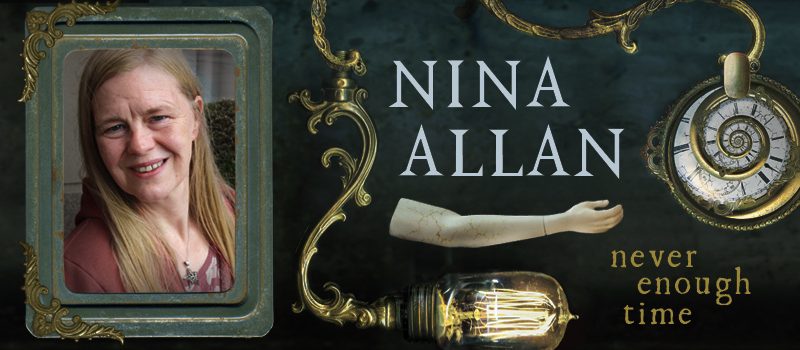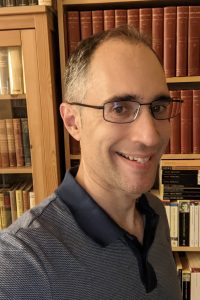Nina Allan: Never Enough Time

Nina Allan was born May 27, 1966 in Whitechapel, London, and grew up in the Midlands and West Sussex. She attended the University of Reading and the University of Exeter, and earned her master’s in literature at Corpus Christi College, Oxford. She has worked in record stores and as a bookseller.
Allan began publishing SF with “Coming Around Again” in 2002. Notable stories include British Science Fiction Association Award finalists “Bird Songs at Eventide” (2005), “Flying in the Face of God” (2010), “The Silver Wind” (2011), and “The Gift of Angels: an introduction” (2018); British Fantasy Award finalists “My Brother’s Keeper” (2009), “Sunshine” (2012), and “Four Abstracts” (2017); Shirley Jackson Award finalists “The Gateway” (2013) and “Maggots” (2016); and Hugo and Sturgeon Memorial Award finalist “The Art of Space Travel” (2016). Novella Spin (2013) won a BSFA Award and was a British Fantasy Award finalist. Her short fiction has been collected in A Thread of Truth (2007) and Microcosmos (2013). Story suite The Silver Wind: Four Stories of Time Disrupted appeared in 2011, and was significantly revised and expanded in 2019; its French translation, Complications (2013) won a Grand Prix de l’Imaginaire. Stardust (2013) collects her Ruby Castle stories.
A respected critic, Allan has a BSFA Award-nominated column, “Nina Allan’s Time Pieces”, in Interzone. Her essay “Time Pieces: Doctor Change or Doctor Die” (2015) was a BSFA Award finalist as well.
Her novels are Kitschies Award and Campbell Memorial Award finalist The Race (2014), Campbell Memorial Award finalist and Kitschies and BSFA Award winner The Rift (2017), and The Dollmaker (2019).
Allan lives on the Isle of Bute with her partner, author Christopher Priest.
Excerpts from the interview:
“Writing was something I did compulsively from the age of about six or seven – as soon as I could actually write. It came so naturally to me. I kept little journals where I would write things down and illustrate them. I felt compelled to write things down, almost as if whatever happened in my life hadn’t really happened until I recorded it. Nobody told me to do that; certainly, nobody in my family did that. I absolutely adored books from the time I could read, and I fell into a storytelling mode very naturally. At my first school in the Midlands, most times in the morning assembly, our headmaster would tell us a story. It was usually a little fable, maybe an adapted Bible parable, or something like that – not super Christian, but a little moral tale. He told this story one day, and I liked it because it had animals in it and I loved animals – but I didn’t like the ending. I can’t now remember what it was I disliked or even how the story went, but I do know I went back to my classroom and wrote an alternative version of the story, including the ending I preferred. My form teacher seemed very excited by this, and took me down to the headmaster’s study, and they stuck a gold star on the story. I couldn’t work out what the fuss was about or what was so extraordinary about what I’d done, but I guess, looking back, I was only about six and a half, so that was quite interesting to them.
“The oddest thing about it is I wrote in a speculative mode. I loved horror stories. I watched my first Doctor Who episode at the age of six or seven – I remember watching ‘The Green Death’, which was a Jon Pertwee episode – and I was horrified, but I also thought Doctor Who was exclusively for me. Every week, there was a program on Saturday evening with monsters in it, and I could turn that on, and there it was. Neither my mother nor my father were into fantasy or science fiction, but my mother had John Wyndham’s The Day of the Triffids, the orange-spine Penguin paperback. I think the secret to that was, those paperbacks were never sold in the UK as SF. They were just Penguin books. She had that, and The Midwich Cuckoos, and The Kraken Wakes, and I read those when I was ten or 11. Those were the kind of stories I was writing when I was at my first intermediate school – stories about kids going off in the hot summer weather and discovering an alien spacecraft in an old quarry. They were really influenced by Doctor Who, but with kids transmuted into the positions of the main characters. I loved speculative stories and ghost stories. I remember being allowed to watch the Tourneur Night of the Demon when I was probably too young, but it was like, ‘Oh my God, I’m desperate to watch Night of the Demon.’ I was just naturally drawn to the fantastic.
“I was aware that these stories were different from the stories I was given in school, but SF seemed so aligned with the way I saw the world. Not that I thought aliens were going to come down – but I thought they might. We didn’t have YA literature when I was a child. There were children’s books, and then there were books that would now be classified as YA or middle grade – authors like Philippa Pearce, Nina Bawden, and E. Nesbit. I was drawn naturally toward tales where kids somehow misbehaved and got sucked into an extraordinary story in a world apart. There was one by a British writer named Hilda Lewis, called The Ship That Flew, about kids who would go back in time to Norman England, or to the court of Henry VIII, and be caught up in that world and dragged into a perilous adventure and in danger of changing the course of time. They weren’t classified as SF – these were books you just found, and I had a way of finding them. Until I was 11 or 12, I wasn’t really aware of authors. It was just like, ‘Oh, there’s that book with the strange house on the front, I’m going to get that out from the library again.’ Penelope Farmer’s Charlotte trilogy – The Summer Birds, Emma in Winter, Charlotte Sometimes – I really dread to think how many times I must have taken those out of the library, because I loved them so much. They’re timeslip stories. A young girl suddenly wakes up in a Victorian boarding school as an alternate version of herself. She loses her parents. That was common. Some of the authors of these stories, their parents put them into boarding schools while they were working in India or the army or that kind of thing, so a lot of writers grew up separated from their parents. I think the stories grew from that. There are a lot of boarding schools in British young people’s literature from that period.
“I have taken up that tradition. People talk about the idea of loss in my fiction, and it is always there. Those things happened. My parents split up when I was 12 or 13, and my family’s been scattered ever since. I’m always trying to make sense of what’s happened to me – I’m not aware of doing it in a conscious way, but these are the stories that come out again and again. I would say I had a happy childhood. If I wasn’t reading, I was outdoors searching for insects, drawing bugs, climbing trees – I was very active like that. I got dirty, played spy games and war games, was out there running around, searching, building dens – enacting stories, I guess. I was very happy, but I did feel, from the age of seven or so, a deep awareness of time and time passing. I was always aware of wanting to pin memories in place, and that’s the function my writing served from a young age. It sounds crazy to say I did that from the age of seven, but it’s true. I remember at ten, being on holiday with my family and thinking, ‘This is the last summer before I go up to big school. Everything will be different this time next year. I have to remember this as it is now.’ I think it’s that sense that pervades my fiction; the sense of being an observer, and the sense of being in mourning, almost, for the passing of time and what that does to your relationships, to your sense of self, and your sense of mortality. Nabokov wrote about the same thing. He called it ‘chronophobia,’ a fear of time. I studied Nabokov – I wrote a postgraduate thesis, ‘Madness, Death, and Disease in the Fiction of Nabokov’ – and I was very interested in the way he portrayed the artist, because all his books are about the artist as god, or art as a replacement for God. He didn’t believe in God, but he believed in art and its transformational power. I do too, in a sense, and I have that sympathy for a hyperawareness of oneself in a landscape and oneself within the passage of time.
“Ada, or Ardor is Nabokov’s masterpiece. I read it two or three times, and I was profoundly shocked when I discovered from a TV documentary that Martin Amis never read it. He constantly puts himself forth as a Nabokov disciple, but he’s only really read Lolita and the early satiric/comic novels, if you can call King, Queen, Knave and Invitation to a Behead ing comic. He didn’t finish Ada, and I thought, ‘You faker!’ Nabokov is known as a virtuoso stylist, but if you read a page of Nabokov, you realize that his stylistic fireworks come simply from being naturally conversant with several languages. That happened to him because he lived in three or four countries, so he spoke those languages, just as he grew up speaking English as well as Russian because he was taught it from a young age. Those were normal things for him, so his ordinary way of expressing himself would have been of thinking, in constant linguistic allusions and linguistic shifts. That shifting between different states of reality was also normal for him, as he shifted out of the most ultra-privileged upbringing, with a semi-aristocratic background and being very close to people in power, to losing absolutely everything in the Bolshevik Revolution of 1917. His writing about the Russian Revolution isn’t straightforward. He refused to acknowledge that he lost his estate, and lost his childhood in the forests where he spent summers – that world was forever barred to him. That is his enchanted world, his Narnia, and he was split from that forever, and could never go back. His writings about that Russia, and about the tyranny that descended, are always metaphoric and masked almost through fairytale, in stories like ‘Tyrants Destroyed’, or the main villain in Bend Sinister – it’s allegorical writing about dystopia, and it’s absolutely fascinating. He was writing fantastical fiction.”
Interview design by Francesca Myman. Photo by Liza Groen Trombi.
Read the full interview in the March 2020 issue of Locus.
 While you are here, please take a moment to support Locus with a one-time or recurring donation. We rely on reader donations to keep the magazine and site going, and would like to keep the site paywall free, but WE NEED YOUR FINANCIAL SUPPORT to continue quality coverage of the science fiction and fantasy field.
While you are here, please take a moment to support Locus with a one-time or recurring donation. We rely on reader donations to keep the magazine and site going, and would like to keep the site paywall free, but WE NEED YOUR FINANCIAL SUPPORT to continue quality coverage of the science fiction and fantasy field.








